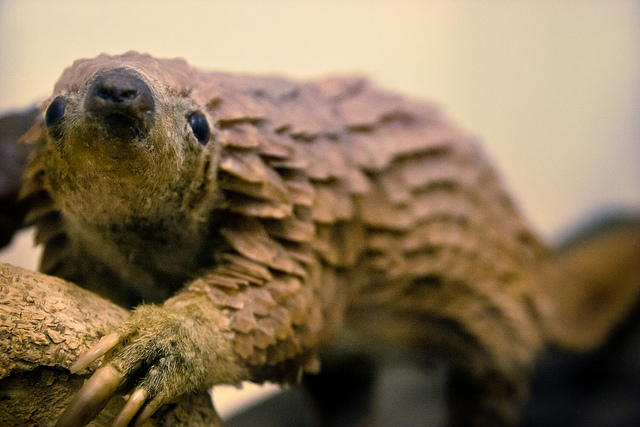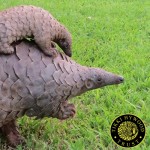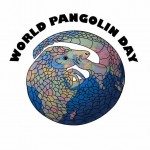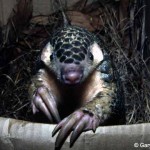Malaysian authorities seized a total of 171 pangolins, impounded two vehicles, and arrested five locals over the weekend.
The News Strait Times reports that law enforcement officers made two busts this past weekend, but it is unclear if the two are related.
The first, they say, took place on Saturday, when two men driving a four wheel drive vehicle were stopped at a roadblock in Jeli.
The officials discovered 16 pangolins in the vehicle (which they ultimately impounded) and arrested the pair of suspects.
Less than 24 hours later, a police team in Bachok found three men packing scaly anteaters into nets when they raided a house at an unmarked house in Kampung Alur Tok Majan.
They confiscated 155 pangolins, which the authorities say was the largest pangolin seizure to have taken place in the area in five years.
The three men were arrested and another four wheel drive vehicle was impounded.
Deputy assistant officer Ngau said he believed the animals had been sourced from other states in Malaysia and were likely bound for Thailand.
Although there is some demand for pangolin flesh and scales in Thailand, the country is more often used as a smuggling route to get the contraband to black markets in China and Vietnam.
The suspects and the scaly anteaters have reportedly been handed over to the state Wildlife and National Parks Department.
Unfortunately, these arrests and seizures do not amount to anything if the cases are not prosecuted to the fullest extent of the law.
Recently, Malaysia’s wildlife management agency, commonly known as ‘Perhilitan’, granted bail to two individuals suspected of selling endangered wildlife online, much to the dismay of wildlife protectionists globally.
Record-sized pangolin among those seized
Deputy assistant officer, Cosmas Ngau, said that one of the pangolins seized in the second bust was the largest they’ve ever seized — apparently weighing ten kilograms.
Although some pangolin traders have been known to force a starchy substance into the animals’ stomachs to increase their weight (and thus the profit that can be made from them), it is not known if this could’ve played a role in the abnormally large pangolin’s size.
News Strait Times said that all 171 pangolins seized in total this past weekend were endangered Sunda pangolins, which typically weight about 4.2-7.5 kilograms, according to the Zoological Society of London.
Malaysia: more busts so far this year than in all of 2011
Last year, media reported on no fewer than six pangolin busts in Malaysia, which involved the seizure of at least 1,292 pangolins.
The largest of them apparently saw the frozen flesh of some 1,068 scaly anteaters confiscated from a ship in Sabah.
Already in 2012, there have been reports on a minimum of seven busts (including the most recent two), which have involved at least 428 pangolins.
This is more than double the number of these imperiled insectivores that had been seized by this time in 2011.
It is important to remember that the animals seized by authorities reflect only a small percentage — some experts believe only 20% — of the true amount moving through the illegal trade circuits.
Pangolins in peril
An estimated total of 41,000 (and perhaps as many as 60,000) pangolins were plundered from the wild in 2011 to supply a seemingly insatiable demand for the creatures, which stems mainly from China and Vietnam.
Their flesh is consumed both as a delicacy and for perceived “health benefits”, such as kidney nourishment.
Other parts of their body — particularly their scales — are highly sought after for superstitious use in traditional Chinese medicines as a “cure-all” remedy for things like weight loss promotion, lactation stimulation, swelling reduction, improved liver function, and even as a cancer cure, among other things.
However, the animals’ scales are chiefly comprised of keratin — much like rhino horns, another lucrative black market item used in traditional Chinese “medicines”.
Scientific studies have demonstrated that rhino horn holds no curative medicinal properties, which means the same is likely true for the similarly composed pangolin scales.
Unfortunately, ‘medicinal use’ pangolin farming ventures in China appear to be stimulating the demand and perpetuating the myths surrounding these imperiled creatures.
Author: Sarah Pappin. Read more about Sarah here.
Want to help? Check out our pangolin t-shirts: Project Pangolin is contributing $2.00 per t-shirt or hoodie to Education for Nature-Vietnam.
Image by Orin Zebest on Flickr






Comments are closed.